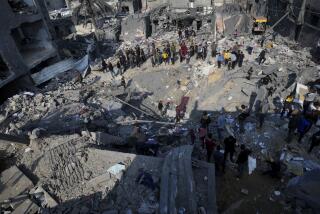Israel Concerned About Iraqi Missiles Near Jordan’s Border
- Share via
TEL AVIV — A senior Israeli officer expressed deep concern Friday over new long-range missiles that Iraq has recently deployed near the Jordanian border.
“They could use those missiles against civilian targets in Israel,” warned the officer, who spoke on condition that he not be identified. “This means that Iraq could hit targets in Israel without engaging our forces on the ground. What particularly concerns us is they have a ‘non-conventional’ capability for those surface-to-surface missiles.”
In the parlance used at the Israel Defense Forces headquarters, whose most prominent feature in central Tel Aviv is a skyscraper bristling with electronic antennas, “non-conventional” means chemical, biological and even nuclear warheads instead of ordinary explosives. Intelligence officers say Iraq possesses chemical weapons, including nerve gases, which they used during the 1980s against the Kurdish minority and Iran during the Persian Gulf War.
In recent weeks, the officer disclosed, Israel learned that the Iraqis were building what he called a “massive and intensive missile infrastructure” in the far west of Iraq, near the border with Jordan.
The missile bases are at points that originally were pumping stations along the pipeline that ran from Iraq’s Kirkuk oil fields through Jordan and into southern Lebanon’s coast. Use of the line has been discontinued.
During the 1973 Middle East War, Arab antagonists fired short-range, Soviet-made Frog missiles against Israel, but these did little damage. Since then, however, Iraq has received longer range, Soviet-produced Scud ground-to-ground missiles, which normally have a range of 300 kilometers (186 miles).
Although Israel may be a potential target for missiles from the new bases, the officer said: “I would think King Hussein (of Jordan) would be the one to be most frightened. Though he is now on good terms with (Iraqi President) Saddam Hussein, Kuwait was also Iraq’s close ally, giving him $30 billion during the Gulf War.
“Syria also has good cause to be worried, since those missiles could easily hit Damascus,” he added. Syria and Iraq are perhaps the most bitter rivals in the Arab world.
Israeli intelligence sources believe Iraq’s Hussein is striving toward a nuclear weapons capability to match that held, in the view of most analysts, by Israel. But a suspected Iraqi effort to build nuclear weapons was thwarted by a successful, long-range Israeli air strike in 1981 that destroyed an atomic-reactor complex near Baghdad.
More to Read
Sign up for Essential California
The most important California stories and recommendations in your inbox every morning.
You may occasionally receive promotional content from the Los Angeles Times.













